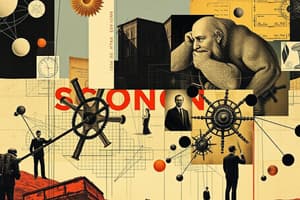Podcast
Questions and Answers
What do we rely on according to 2 Corinthians 5:7?
What do we rely on according to 2 Corinthians 5:7?
faith
Which of the following are outcomes expected from the study of Science, Technology and Society? (Select all that apply)
Which of the following are outcomes expected from the study of Science, Technology and Society? (Select all that apply)
- Discuss basic concepts of Science, Technology and Society (correct)
- Analyze historical events
- Define science, technology, and society (correct)
- Discuss the foundation of Science, Technology and Society (correct)
What is the meaning of 'tekhne' in Greek as it relates to technology?
What is the meaning of 'tekhne' in Greek as it relates to technology?
- Science
- Art or Craft (correct)
- Knowledge
- Research
The first scientific revolution included figures like Galileo Galilei, Nicolas Copernicus, and _____.
The first scientific revolution included figures like Galileo Galilei, Nicolas Copernicus, and _____.
What is the process used to solve everyday problems or questions called?
What is the process used to solve everyday problems or questions called?
What does hypothesis testing include?
What does hypothesis testing include?
A hypothesis is always proven to be true.
A hypothesis is always proven to be true.
What term describes the commercialization of prototype inventions?
What term describes the commercialization of prototype inventions?
Match the following branches of science with their categories:
Match the following branches of science with their categories:
Flashcards are hidden until you start studying
Study Notes
Understanding Science, Technology, and Society
- Faith is emphasized over sight, suggesting reliance on belief systems in understanding the world.
- Science, technology, and society are interrelated concepts that shape human experience and understanding.
Definitions
- Science: Systematic body of knowledge about the natural world obtained through the scientific method.
- Technology: Application of scientific knowledge, involving the art of crafting and industrial processes.
- Society: The community of individuals engaged in social relations and their practices within various contexts.
Branches of Science
- Natural Science: Focused on the physical and biological aspects of the world.
- Physical Science: Includes physics, chemistry, geology, meteorology, and astronomy.
- Biological Science: Covers fields such as biology, zoology, botany, and pathology.
- Social Science: Examines human behavior and societies, including sociology and humanities.
Scientific Inquiry Process
- Involves systematic methods for problem-solving and research, also known as the scientific method.
- Steps include:
- Formulating a question or problem.
- Conducting observations and research.
- Creating a testable hypothesis.
- Designing and executing experiments, with a focus on measurable outcomes.
- Analyzing data and drawing conclusions to accept or reject the hypothesis.
- Communicating results effectively.
Hypothesis vs. Theory
- A hypothesis is an educated guess that remains unproven until tested and confirmed through research.
- A theory is a well-substantiated explanation developed from a hypothesis after rigorous testing.
Historical Figures in Science
- Galileo Galilei: Italian polymath known for contributions to astronomy and physics, notably the telescope and discovery of Jupiter's moons.
- Nicolas Copernicus: Pioneered the heliocentric model of the solar system.
- Charles Darwin: Developed the theory of evolution through natural selection.
Potential Threats to Earth
- Risks include nuclear war, biological and chemical warfare, climate change, ecological collapse, pandemics, asteroid impacts, supervolcano eruptions, and unknown risks.
Technology Development Process
- Involves identification of needs, conceptualization of solutions, execution of plans, and practical application.
- Innovations: Transform prototypes into marketable products, driving research and development forward.
Studying That Suits You
Use AI to generate personalized quizzes and flashcards to suit your learning preferences.




